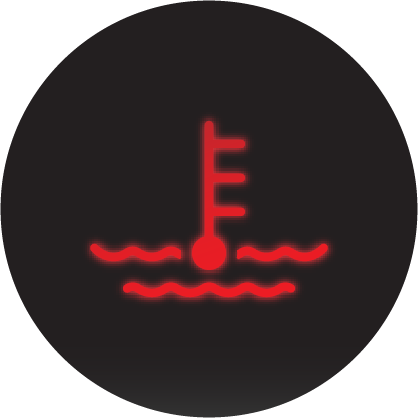The engine is, of course, a very important part of any vehicle. Engines are built to withstand a certain temperature, and they come with cooling systems to help prevent overheating. From time to time, weather can pair with leaks, corrosion, or other issues and your car’s engine can overheat. This can lead to costly damage, so it’s important to stop driving and let your car cool down if it gets too hot. In this article, we’re going to cover signs you should look out for, causes of overheating, and what to do (and not do) if your engine overheats.
An Overview of Cooling Systems
Your engine’s cooling system is designed to keep heat off of your engine. Coolant (sometimes referred to as antifreeze or radiator fluid) will circulate throughout the engine, absorbing heat and pulling it away from the engine. This is also where the heat in your vehicle’s cabin comes from when you turn on the heater.
Signs of Engine Overheating
Here are a few signs your engine is overheating.

- You may see a warning light on your dashboard. This could be an engine temperature light like what’s pictured to the left. It may also be a check engine light or a light that says “TEMP.”
- You may notice a strange smell. Coolant typically smells sweet and motor oil typically smells burnt.
- You may see smoke or steam coming from your engine.
If you notice any of these things, it’s important to pull over to a safe spot as soon as possible. Turn your vehicle off and allow it to cool down before continuing anywhere.
What to do if Your Engine Overheats
Like we mentioned above, the first thing you should do if your engine begins to overheat is pull over. Pick a safe spot where you can turn the vehicle off. If you have to drive a little bit before you can pull over, turn the air conditioning off. Turn the heat on—this will help to pull heat away from your engine. You can also open the windows to get more heat away from your car.
Once you’ve stopped safely and turned the vehicle off, do not open the hood. Allow the car to cool down naturally before you open it. Coolant can become very hot and opening the hood before things have cooled down can cause burns or other injuries.
While you are waiting for your car to cool, consider calling roadside assistance. You’ll want to have your vehicle checked by a mechanic as soon as possible. If you’re not in a position to call for a tow, you can try restarting your engine and driving once the temperature has dropped. Keep an eye on your car’s temperature gauge, though, and pull over to let the system cool down again as needed.
Common Causes for Overheating Engines
There are a lot of things can cause overheating in an engine. Below is a list of some common causes.
- Leaks and Contamination—Both your coolant and your engine oil can leak or become contaminated overtime. The coolant absorbs heat from your engine and the engine oil reduces friction. If either fluid level is too low or too contaminated to work properly, your engine may become overheated. To prevent this, have your oil changed regularly and check your coolant levels during routine maintenance.
- Faulty Thermostat—Your engine’s thermostat helps to regulate the cooling system. If it fails, your engine may get too little (or sometimes too much) coolant. While too much coolant might not cause overheating, it can cause other engine problems. Either way, it’s important to have your cooling system maintained on a regular basis to avoid a faulty thermostat.
- Failing Radiator—The radiator is another important part of your vehicle’s cooling system. It circulates a mixture of coolant and water through the engine to absorb heat and carry it away from the engine. If the radiator becomes blocked or damaged, or if there’s a leak, your engine can overheat.
- Worn Water Pump—The water pump works with the radiator to keep coolant moving through the engine. Like the radiator, the water pump and its hoses can sometimes spring a leak. This leads to improper coolant levels that eventually cause overheating. If your water pump is failing, there may be a puddle of coolant under your car or steam coming off of the radiator. It’s important to have your water pump fixed as soon as possible to avoid overheating.
- Poor Engine Ventilation—As the seasons change, your car may pick up leaves and other debris. This can block the ventilation built around your engine, causing it to overheat. Check your car for any obstructions and remove them to keep air flowing properly.
Call Restored Auto, LLC for help.
If your engine overheats, it’s important to find out why sooner rather than later. Even a small problem can become a big one when it’s not dealt with. The experienced mechanics at Restored Auto, LLC can help with your vehicle. We’ll take a look under the hood, diagnose the issue, and get you back on the road safely. Call us today to schedule an appointment.

